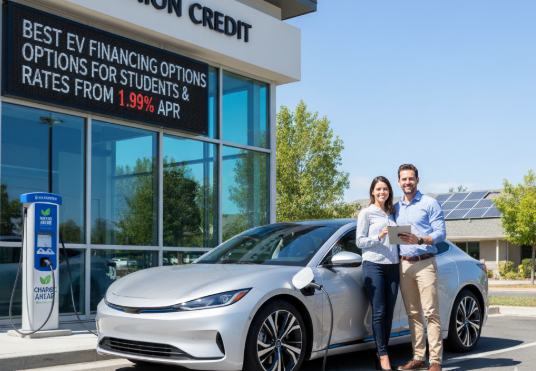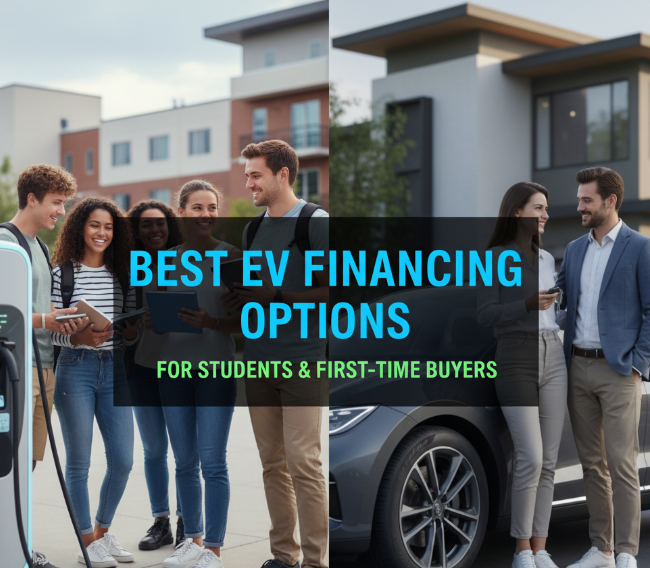Introduction: Why Students and New Buyers Need Smart EV Financing
Electric Vehicles (EVs) are no longer just futuristic gadgets. They’re becoming a practical choice for students and first-time buyers who want to save on fuel costs, lower maintenance bills, and reduce their carbon footprint. But while EVs are getting cheaper, the upfront price can still be challenging—especially for college students or people buying their very first car.
That’s where EV financing options come in. The right loan, lease, or incentive program can make driving an electric car not only affordable but also smart for your long-term financial health.
In this guide, we’ll break down the best EV financing options for students and first-time buyers in 2025, covering:
- Student-friendly EV loan programs
- Low-interest loans from banks and credit unions
- Leasing options designed for first-time buyers
- Federal and state EV incentives
- Tips to boost approval chances with limited credit history
By the end, you’ll know exactly how to choose the right EV financing option for your situation.
Why Financing an EV Is Different from a Gas Car
Before diving into loan options, let’s look at why EV financing works a bit differently compared to traditional cars:
- Higher Upfront Cost: EVs usually cost more than similar gas cars, though incentives and financing can balance this out.
- Lower Running Costs: Electricity is cheaper than gas, and EVs require less maintenance (no oil changes, fewer moving parts).
- Special Incentives: Governments, universities, and automakers often offer exclusive EV discounts and rebates to help new buyers.
- Fast-Changing Market: EV technology evolves quickly, so leasing can sometimes make more sense than buying.
This mix of higher purchase price but lower lifetime cost makes financing decisions crucial for students and first-time buyers.
Top EV Financing Options for Students
1. Student-Friendly EV Loans
Some banks and credit unions provide special auto loan programs for students. These often have:
- Lower down payments
- Flexible repayment schedules
- Co-signer options (parents or guardians can help improve approval chances)
💡 Tip: Look for federal credit unions near universities, as they usually provide loans tailored for young or first-time borrowers.
2. Federal Student-Friendly Programs
While there’s no direct “student EV loan” program from the U.S. government, you can combine EV purchase with federal incentives:
- Clean Vehicle Tax Credit (up to $7,500) – Applies to eligible EVs if you meet income limits.
- Used EV Tax Credit (up to $4,000) – Perfect for students buying second-hand EVs.
- State-level EV rebates – Many states like California, New York, and Colorado offer cash rebates on EV purchases, which reduce the amount you need to finance.
3. Leasing Options for Students
Leasing is one of the most student-friendly EV financing options because:
- Lower monthly payments than loans
- Warranty coverage (less worry about repair costs)
- Option to upgrade to newer EV tech after 2–3 years
👉 If you don’t drive too much (like most students), leasing could be cheaper than buying.
Best EV Financing Options for First-Time Buyers
1. First-Time Buyer Auto Loan Programs
Banks and automakers often provide “first-time buyer” loan programs for people with little or no credit history.
These programs usually:
- Require proof of stable income (part-time job, full-time job, or stipend)
- Allow smaller down payments
- Include educational tools to help build credit responsibly
Popular lenders offering first-time auto loans include:
- Capital One Auto Finance
- Wells Fargo First-Time Buyer Program
- Credit Unions (like Navy Federal or local student-focused CUs)
2. Manufacturer Financing Deals
Automakers want to encourage young buyers to get into EVs. Many run special financing deals for first-time or student buyers:
- Tesla: Sometimes offers low-interest financing for new graduates.
- Nissan: Known for flexible financing options on the Leaf.
- Hyundai & Kia: Run college graduate programs that lower interest rates or reduce down payment needs.
3. Buy vs. Lease for First-Time Buyers
| Factor | Buying EV | Leasing EV |
|---|---|---|
| Monthly Cost | Higher | Lower |
| Ownership | Yes | No |
| Upgrades | Harder | Easy (after 2–3 years) |
| Best for | Long-term savings | Students, first-time buyers, tech-focused drivers |
👉 First-time buyers who aren’t sure how long they’ll keep the car often prefer leasing. But if you plan to own it long-term, buying is smarter.
Comparing EV Financing Options
Here’s a simple breakdown of the main EV financing choices available to students and new buyers:
| Financing Option | Monthly Cost | Credit Requirement | Best For | Extra Benefits |
|---|---|---|---|---|
| Traditional Loan | Medium–High | Moderate | Buyers with stable income | Ownership, build equity |
| Credit Union Loan | Low–Medium | Low | Students, first-time buyers | Lower rates, flexible terms |
| Lease | Low | Moderate | Students, tech-savvy drivers | Lower payments, warranty included |
| Manufacturer Financing | Medium | Moderate | New graduates, first-time buyers | Cash bonuses, reduced APR |
| Government Rebates | Reduces loan need | None | Everyone | Up to $7,500 savings |
Tips to Boost EV Loan Approval for Students & New Buyers
- Get a Co-Signer – A parent or relative with good credit can help secure a better loan rate.
- Start with a Used EV – Cheaper, easier to finance, and eligible for the $4,000 used EV credit.
- Show Proof of Income – Even part-time jobs count toward loan applications.
- Build Credit Early – A student credit card or small loan can improve approval chances.
- Compare Multiple Lenders – Never accept the first offer; shop around for the best deal.
Example: EV Financing for a Student
Let’s say Sarah, a college student, wants to buy a used Nissan Leaf for $18,000.
- She qualifies for the $4,000 used EV tax credit, lowering her effective cost to $14,000.
- Her credit union offers a student-friendly loan at 5% interest with a co-signer.
- Monthly payments: about $265 over 5 years.
If Sarah had leased instead:
- She could drive a new EV for $220/month but would return it after 3 years.
👉 This shows how both buying and leasing can be smart, depending on long-term goals.

Cost of Owning vs Leasing an EV (5-Year Comparison)
| Expense Type | Buying New EV | Leasing EV | Buying Used EV |
|---|---|---|---|
| Down Payment | $3,000 | $1,500 | $2,000 |
| Monthly Payment | $400 | $250 | $265 |
| Tax Credit | Up to $7,500 | Lease company usually keeps | Up to $4,000 |
| Ownership After 5 Years | Yes | No | Yes |
| Total Cost (est.) | $27,000 | $19,500 | $17,900 |
How Students Can Lower EV Loan Costs
- Apply for state rebates (many give $2,000–$5,000 back instantly).
- Trade in old gas car to reduce the financed amount.
- Take advantage of university partnerships – some schools partner with automakers for student discounts.
- Drive less – insurance companies offer low-mileage discounts (perfect for students).
FAQs: EV Financing for Students & First-Time Buyers
Q1: Can students get approved for EV loans without credit history?
Yes, with a co-signer or by applying through student-focused credit unions.
Q2: Is leasing better for students?
Usually yes, because of lower payments, fewer risks, and warranty coverage.
Q3: Can used EVs qualify for incentives?
Yes, used EVs can qualify for up to a $4,000 federal credit, plus state-level rebates.
Q4: What’s the cheapest EV for students in 2025?
Models like the Chevy Bolt EUV, Nissan Leaf, and Hyundai Kona EV are among the most affordable.
Conclusion: Making EVs Affordable for Young Drivers
For students and first-time buyers, the dream of driving an EV doesn’t have to stay out of reach. With the right mix of:
- Low-interest student loans
- First-time buyer programs
- Leasing opportunities
- Federal and state rebates
—you can step into an EV without breaking your budget.
The key is to compare financing options, consider your long-term needs, and take advantage of every available incentive. Whether you’re a student trying to save on gas money or a first-time buyer eager to build credit, 2025 offers more EV-friendly financing solutions than ever before.
Driving electric isn’t just about the environment—it’s about smart financial planning. With the right financing, your first EV could be one of the best investments you make as a young driver.

Leave a Reply